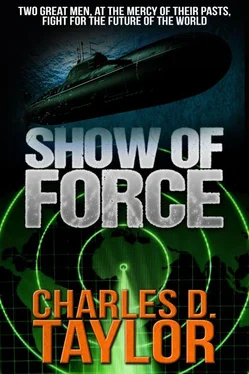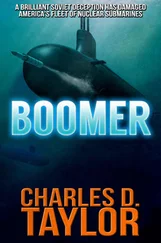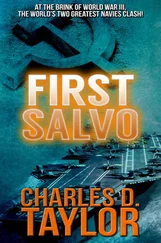"And the missiles, Admiral. Tell me about them."
"Underground, of course."
"I suppose you want to tell me that they arrived in little pieces and then were rebuilt underground."
"No. By submarine." Collier's answers were brusque and confident, and would have given the appearance of absolute authority to almost any other person but Gorenko.
"I don't believe you, of course, Admiral Collier. But you do have what my son, through American acquaintances, calls a big set of balls." Gorenko smiled at his Americanism.
Collier smiled, but said nothing.
"As a matter of fact, I am so sure you are lying to me that we have deployed submarines around your island to ensure your ships do not land the missiles."
"We are aware of that, but I think you will find there are no ammunition ships about to penetrate that barrier."
"We also plan to land on that island and show the rest of the world exactly what your country has been planning.
"Admiral Gorenko." Collier sat forward in his chair, squaring his shoulders. "That would be direct aggression on American territory. Not only would we take every step to prevent that, but I warn you that it would be a grave mistake. You would be proving to the world, the hard way; that we have completed an installation to protect the countries of the Indian Ocean, and I think perhaps you would be doing a good deal of the convincing that we had already planned."
"As I said, you handle yourself like a diplomat. Your bluff is excellent, but I believe the world will respect us more for our willingness to sacrifice some ships and men to maintain a balance of power."
"Admiral Gorenko, you know as well as I do that it's no longer a matter of a few ships and men. My talk with Admiral Carter established that fact."
"I will grant you that. I have been saving these," and he threw more photographs on the desk in place of the others, which he swept to a corner, since I'm sure you haven't seen what's been happening to your precious ships."
The new photos were no better than the others, worse, he noted in examining them, since they were taken from high-altitude spy planes in place of the inoperable satellites. Gorenko had selected the most gruesome of his collection. Collier saw American cruisers, guided-missile destroyers, frigates, all damaged, burning, or in the process of sinking. Even knowing that he would not see anything of Soviet ships in the same condition, he was shocked. It appeared worse than Carter had said.
"We, too, have suffered some damage, Admiral, but not so devastating as your own. Do you still want to continue with this charade?" No answer. "I don't think your Navy would suffer this damage to prevent us from getting to your island if those launchers were already installed and armed," he asserted.
"The United States has as much a proprietary interest in the Indian Ocean as the Soviet Union. We have a base on Islas Piedras that has been threatened by your government. The initial attack was predicated by Russian aircraft. Our ships did not fire until they were fired upon, and I have no doubt aerial photography will substantiate that fact."
"I appreciate your coolness, Admiral Collier, but I'm sure you will also agree with me that the last shot fired is much more important than the first."
Collier knew enough about Gorenko to accept the fact that the man obviously had no intention of backing down. He had read everything about the man that was available and had read translations of his books. Gorenko had been the architect of the Soviet Navy, and his reputation from the days of Sevastopol and the sailor/soldier until now had been one of perseverance. He had survived the Germans against tremendous odds. He had managed to continue a steady career pattern in the face of purges from within his own government. He would not back down from this greatest challenge of all.
"As long as you do not underestimate the willingness of the U.S. Navy to protect that island to the last man, I'm sure we both value the importance of that last shot."
Gorenko appreciated formidable opposition. He smiled widely, this time as a boxer looking across the ring at his opponent would. The smile said "Let the better man win." The American returned1 the smile in the same manner. The feeling was mutual. So much was at stake that they would slug it out toe to toe.
"Since we seem to have come to the end of any negotiating we might have become involved in, would you answer a question for me?" Without waiting for an assent, he continued. "Your messages to your Admiral Charles refer to Task Force 58. That is no task force. It is not large enough. There has been no similar designation recently. What does it mean?"
"No doubt you are familiar with our Pacific War about forty years ago?"
"Of course."
"Nimitz established Task Force 58 at the end of 1943 to sweep the ocean of our enemy." He paused for dramatic effect. "They did just that." He gazed directly at Gorenko, trying to look beneath the blank stare returned to him. The other man said nothing.
Finally, Gorenko said, "You Americans mystify me some times." With nothing more to say, he stood up. "Our meeting must end, Admiral Collier, for there is really nothing more we have to say to each other." He came around from behind the desk and extended his hand. '"I cannot be absolutely sure, but I think we might have been friends at a different time. I will allow you to use your connection to Washington for the next thirty minutes, in the event you would like to report this meeting to Admiral Carter."
"I may. Thank you."
Gorenko paused at the framed pictures on the wall of his otherwise austere office. "I don't believe I showed you these on your earlier visit." Again not waiting for an answer, he continued. "That was taken at Stalingrad, at the worst of times. You likely don't recognize me as the one on the left, do you? That was more than forty years ago also. We were young then, but we looked very, very old, didn't we? We were half starving then, but we continued to fight the Germans. The man on the right is Admiral Kupinsky's real father." He turned slightly to look directly at Collier. "He was also my friend. He saved my life. He died. I lived. I continue to fight on. But we Russians do not forget those sacrifices, even after so many years."
Gorenko pointed to another picture, something in the Cyrillic alphabet. "Do you read Russian?"
"I did once, years ago in Monterey. But it's been so long that I'm afraid I couldn't begin to translate that."
"Then, by all means, I will be happy to read it to you." He paused for just a moment, then began, never looking at the writing, but directly at Collier.
"Russia, my country, my native land! Dear Comrade Stalin! I, a Black Sea Sailor, and a son of Lenin's Komsomol, fought as my heart told me to fight. I slew the beasts as long as my heart beat in my breast. Now I am dying, but I know we shall win. Sailors of the Black Sea Navy! Fight harder still, kill the mad fascist dogs. I have been faithful to my soldier's oath."
He locked back at the old photograph again, then at Collier. "I used to read that to my son, Alex, until he could read it himself. Now he has a copy of that on the bulkhead in his stateroom, and he ensures that all of his people see it, too. We do not give up, Admiral."
"Then, sir, I believe we must both come from the same sturdy stock. I thank you for your time." As Collier stepped through the doorway, the same unspeaking, unsmiling aide was waiting to escort him to the car.
Gorenko went to the door on the other side of the room, calling in one of his aides "I want you to send this message in plain language to Admiral Kupinsky." On a piece of paper, he scrawled in large letters: GET NIMITZ AT ALL COSTS.
And back in the American Embassy, before reporting to Simpson, Admiral Collier went first to his communications room to take advantage of the circuit Gorenko was allowing him to utilize for a short time. But rather than make a report for the benefit of the listening Russians, he simply informed Sam Carter that the Soviets were steadfast and brave and then he made an unusual request, "Sam, do you remember the message CINCPAC sent to Halsey, the one that enraged him, after the Battle of Leyte Gulf, when Nimitz was inquiring after Willy Lee? If not, look it up and send it in plain language to David. He'll understand." And that had been all he had to say, for they both knew the Russians would not turn back from the path they had chosen.
Читать дальше












